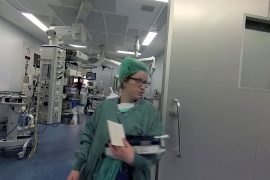A team led by Manel Esteller has discovered an epigenetic mark that allows predicting the response of lung cancer to the anti-PD-1 antibody therapy, the immunotherapy most frequently used in oncology. The discovery, which has just been published in the journal The Lancet Respiratory Medicine, the most prestigious publication in the area of biology and lung diseases, is part of a clinical experiment funded by the Obra Social “la Caixa” and started two years ago, in which 100 patients are participating.
These results will be the key to the application of the most appropriate therapy for each patient in order to lengthen and improve their quality of life and reduce the impact of the toxicity of their treatment.

Immunotherapy is revolutionizing the treatment of cancer. Our immune system, in addition to fight against microorganisms that cause infections, is responsible for eliminating harmful cells such as those transformed into tumors. But when a cancer appears, this means that its cells have learned to hide from the immune system, which does not recognize them and therefore does not destroy them.
The current immunotherapy manages to remove that disguise to the cancer cell and then our defense cells, like the T and B lymphocytes, can act against it. However, there are different types of tumors against which immunotherapy is ineffective. Even within the immunosensitive ones, such as lung cancer, melanoma and kidney cancer, only 30-40% effectively respond to it in the long term. Therefore, it is important to know beforehand if a tumor is going to be or not sensitive to immunotherapy, considering that they are expensive drugs and not without side effects.
The conclusions of the work, which is focused on colon and lung tumors, due to its high incidence, and in those of the pancreas and brain due to its high mortality, delve into a promising path towards the future treatment of cancer. “Epigenetic signals, such as DNA methylation, act as switches of electricity that turn on or off thousands of our genes. Therefore we think that they should also participate in the programs that the tumor cell uses to escape from the control of the immune system”, explains Dr. Manel Esteller.
Specifically, and in relation to the research published in The Lancet Respiratory Medicine, the researcher notes that “by studying hundreds of lung tumors we realized that those who had a specific epigenetic mark, which we have called EPIMMUNE, responded very well to chemotherapy in comparison to those who did not have it. This signature EPIMMUNE is found in one third of lung cancers and has an enrichment in T and B lymphocytes, while patients not responding to therapy have a “cold” tumor microenvironment with immunity inhibiting cells”.
“Now we want to extend this type of epigenetic studies to other tumor types and to other immunotherapies, such as using anti-PD-L1 or anti-CTCLA4 antibodies”, explains Esteller.
The researcher also wanted to highlight that “the progress is the result of the sum of efforts of basic, applied and clinical researchers, as well as the combination of public investment and foundations such as Obra Social “la Caixa”, without which this work would not have been possible”.
Cancer is the first disease that causes mortality in western countries, along with cardiovascular diseases. Every year eight million people die from cancer, 100,000 in Spain and 17,000 in Catalonia. It is a condition caused by genetic alterations, but also by epigenetic alterations. Hereditary cancers represent only 10% of the total, while the other 90% are sporadic tumors. It is known that lung, throat and mouth cancers are mainly due to smoking, but the cause of other tumors is unknown, such as, for example, breast cancer. What is clear is that the epigenetic contribution is very important in the formation of sporadic tumors.



















